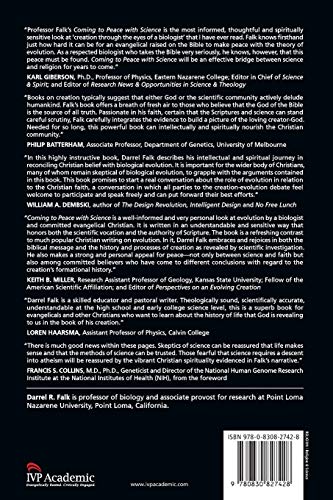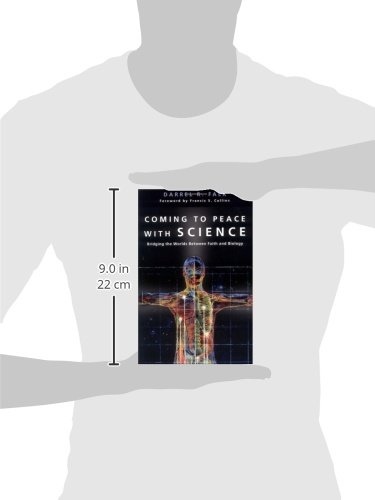Customer Services
Copyright © 2025 Desertcart Holdings Limited
Desert Online General Trading LLC
Dubai, United Arab Emirates




Coming to Peace with Science: Bridging the Worlds Between Faith and Biology
J**S
Scientifically Compelling / Theologically Less So
(4½ stars)Last year around this time I finished the book THE BATTLE OF BEGINNINGS by Del Ratzsch (see review, if interested); this year it's COMING TO PEACE WITH SCIENCE by Darrel Falk. In my opinion both books are eminently worth reading on the creation/evolution controversy, and have provided an edifying education on the subject.It seems to me there are really three crucial angles, or lines of approach, essential to covering this issue: the scientific, the philosophical, and the theological (which encompasses the biblical). Whereas Ratzsch's book dealt (competently) with the second of these, it is in the realm of the scientific data - i.e. the physical nitty-gritty, if you will - that biologist Falk's treatment stands out. In fact thus far in my reading of the relevant literature I have not found elsewhere so strong, concise, and accessible a presentation of the scientific bases (pl.) for belief in what Falk calls "gradual creation". [Side note: I quite like this term, by the way. One could say it is basically equivalent to the standard "evolution" label, but has the advantage of avoiding unnecessary and unintended baggage. After all, "evolution" has so often become merely a skin into which is stuffed all manner of unwarranted (and unscientific) philosophy - usually anti-theistic. Falk, an evangelical Christian, seeks to avoid such unfruitful distraction. Obviously he sees no conflict in Christian belief and a creation-of-life-process which bore much resemblance (physically) to modern evolutionary theory.]I was impressed with Falk's presentation of what the fields of biology, dating, fossilology, geographical distribution of life forms, and genetics are collectively telling us about the history of life on earth. If one does not believe a priori that he/she should not examine with any openness scientific evidence that might call into question certain aspects of their previously held notions, I don't know of a better compendium to direct the honest inquirer to than the relevant chapters of COMING TO PEACE. [And to the reviewer who described Falk's writing abilities as "modest", I think a qualification needs to be made. If such is meant to imply that the material was not communicated extremely clearly, was not skillfully summarized, or was not made remarkably accessible to readers outside the specialist disciplines discussed, I couldn't disagree more. In fact the book's ease of reading is one of its great assets. I have found that many scientific writers claim (and sincerely believe) they are writing for "everyman", but usually are kidding themselves. With Falk the cliché is actually true.]Unfortunately, as is clear from this review's title, I can not praise the book's sections on theological content with the same degree of enthusiasm as I do the scientific material. Or to put it another way, I found Falk the biologist much more persuasive than Falk the theologian. Not that I (personally) disagree with his overarching assertion that the God of the Bible has worked his act of life-creation in a manner that is not incompatible with much of the outline drawn by today's scientific consensus (again, gradual creation). But I am speaking of Falk's avoidance of addressing many of the specific nettles involved in this harmonization. I felt the author was too liberal in his appeal to `metaphor' in the scriptural account. If this is done indiscriminately it gives, in my opinion, an impression too like that of schmoozing; as though any apparent difficulty which exists in the biblical record can always be swept under the rug of `figurative language'. And if the author felt that such narrowly-focused sticking points lay outside the intended scope and audience for the book - fine. But that is different from advancing an apparent method of resolution that (in my eyes, at least) does not stand full scrutiny. Also (and again I'll place this under the "theological" tab), I would very much have liked Falk to address the commonly believed and often forwarded idea that an objective analysis of the physical data SHOWS (or if not shows, strongly suggests) that the idea of an unseen Guiding Hand - espoused throughout the book - is untenable. If memory serves, I once read an article by Stephen Gould in Natural History magazine that made this very point (I could be mistaken, though). Obviously Falk disagrees, but meet it head-on.To encapsulate my thoughts on the book, I would restate the following: I am very glad I read CTPWS, and found much that was solid, forceful, and extremely helpful as I continue to struggle through the issue it seeks to explain. Specifically, the scientific synopses were superbly handled. On the other hand, the fact that the biblical/theological treatment was not of the same prime caliber left me in something of a quandary. In this respect, the hope I had of really unifying these two facets in my own mind is still a quest uncompleted (or not fully completed).Final note: I can't say enough about how much I appreciated the gracious tone Dr. Falk has taken in this book. Beyond polite, the reader senses a genuine Christian warmth toward them, and the sincere motivation to be of help in navigating their way through this thorny issue.
S**K
The Art of Gentle Persuasion
Coming to Peace With Science is an oddly successful book. Odd, because it satisfies neither the esthetic tastes of a hardcore science reader, nor the sensibilities of a confirmed reader of evangelical Christian literature, and yet it accomplishes its goal: opening doors to thought. Proof? First, I'll simply point to the reviews of the book already published on Amazon: multiple accounts of palpable relief as the committed believer in the Bible is able to finally reconcile their religious heart and soul with the more fact driven brain.Secondly, a personal story. I'm a formerly devout Catholic, now in a state usually described as agnostic: I don't see any evidence that there is a God that personally intervenes in our lives, and I don't believe in an afterlife. Nevertheless, I'm awed constantly by the universe in which I live, and it has been a deep source of pain to me that many evangelical Christians reject the astounding beauty of the natural world, brought to marvelous fruition by natural selection (evolution). I have a sister that is an evangelical Christian, and for years, we sparred (at times bitterly) on the subject of evolution. Both now in our fifties, we attempted to beat our ideological swords into ploughshares by seeking a book to read together, and discuss afterwards. Coming to Peace was that book. When I read the book, I was forcefully reminded of the peace and comfort that a deep-seated belief in God brings to some people (I remain not a member of that tribe). It left me more respectful of the believer. When my sister, who lives near Washington, D.C., read the book, she responded this way: "Dan, this book has changed my life. I can't go outside without seeing the world in an entirely different, and much more beautiful way. It's incredible!!! I went down to the Smithsonian Museum of Natural History last week. Wow!! I was fascinated and amazed as I walked through the halls thinking how amazing evolution is, and how great is the God that could come up with such an amazing way of bringing us this beautiful world that we live in!!!" Yes. My sister likes exclamation points.How did Falk facilitate my sister's tectonic shift regarding science? By being respectful. By being gentle. By describing his own emotions, both high and low, as he took his own journey towards recognition that a) natural selection/evolution is undeniably true and b) not contradictory to his evangelical faith in Christ. By repeatedly affirming his belief in a Creator that watches over us, and simultaneously uses natural law (including natural selection/evolution) to build His marvelous universe.Falk's skills as a writer are modest, and some of his observations will certainly make a reader whose only religion is scientific data, well interpreted, squirm. Falk's gift, however, is as a bridge builder, a bridge that spans a chasm that never needed to be there in the first place. I will never convince my sister that God is not compulsively monitoring the well being of every sparrow in the field, nor will she ever convince me of that heaven or hell for eternity may be in my future. Thanks to Falk, however, when my sister and I hike together, we see the wonderful adaptation of the flower to its climate, the adaptation of the insect to the flower (and vice-versa!), and the astounding, awe-inspiring beauty of a world set in motion by a few simple natural laws, natural selection being one of them. My sister and I celebrate this together, and for that, I celebrate Coming to Peace With Science!
L**S
Science and God are not at odds
This author bridges away from those fundamentalists who make unsupportable claims about all of creation occurring within a 6 day period less than 7000 years ago. How to work in science based fields and still believe in an omnipotent God is a struggle for many. The theologians who espouse the notion that the original proto-Canaanite Phoenician character based Genesis language supports a strict 6 day creation simply do not have that language around to support that claim. What is key is to be able to encourage a personal relationship to God as Abraham had without being pushed away by theologians insulated from reality by a religious system culture which mandates adherence to their own ideas. I have heard a theologian state that if the 6 day creation less than 7000 years ago is rejected, one is incapable of believing in God. However, he is willing to believe that God would deceive us by sending us light from stars that are millions of light years away as measured by physics that have not ever been challenged.This author also seems to address scripture as inerrant in intent but not always in construct. Clear to many is that Biblical history is made by imperfect men, even those inspired to produce the supreme art that is scripture. Its awesomeness art is not to be the focus but rather the underlying messages, the key one of which is that God loves mankind, each of us individually and our foremost duty is to love Him back. If we can establish that relationship, if we can live within it, life would be better for the vast majority of us.In summary, this author nicely relates his reasoning past this dilemma that many of us face and in that way, makes faith available to many who would throw out faith otherwise because of well meaning but errant theologians.
E**R
Five Stars
The book came in perfect condition and well on time. I am completely satisfied....
D**L
Five Stars
An interesting look at Science and Christian belief.
Trustpilot
3 weeks ago
5 days ago